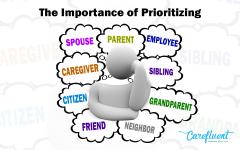The Importance of Having a Care Plan

Staying healthy is our number one goal. Afterall, health equals wealth! But, with the spread of communicable diseases (COVID-19, flu, chicken post/shingles… to name a few), avoiding illness is increasingly difficult.
The U.S. is experiencing a seismic shift in the demographics of its population. By 2030, Americans aged 65-and-older will comprise 21 percent of the U.S. population and will outnumber the minor children. This population is living longer and choosing to remain independent and, in their own homes, as they age. According to the U.S. Centers for Disease Control and Prevention (CDC), 8 out of 10 Coronavirus deaths were adults aged 65 years and older. Eighty percent of Americans aged 65 and older have at least one chronic condition; almost 70% have two or more. For those suffering from chronic conditions, managing treatments while maintaining quality of life is challenging. For this reason, developing a care plan that is individualistic and reflects your values and needs is critically important. To be clear, we believe that all adults could benefit from having a care plan. Whether you are in your early twenties or late nineties, a change in health status can happen at any time, unexpectedly. By creating a comprehensive care plan, we ensure that we receive the highest level of care in moments when we are unable to communicate our wishes. It can also help to alleviate some of the stress our loved ones would endure if they were called to make tough decisions in the event of a significant decline in our health status.
First things first: Select a health care proxy. This is the individual who you authorize to make health decisions on your behalf if you were to become incapacitated. We highly recommend selecting a family or friend you trust and who is willing and able to carry out your wishes. State laws on scope of the authority of health care proxies varies, so check the laws in the state where you reside to learn about what your proxy can, and can’t, decide. Make sure the person(s) you select meet the state-specific requirements to serve in this capacity. We also recommend selecting at least two backup proxies. Your health care proxy should not be your doctor or others directly involved in providing your medical care.
Create your care plan. This includes your health care power of attorney/advance directive which is the tool used to name your health care proxy. This can be done very simply using web-based forms that are available for free. Or, for more complex or comprehensive estate planning, we recommend hiring an attorney to assist you. Regardless of which option you select, be sure to share your power of attorney/advance directive with your medical care team, family, and, of course, those selected to serve as your health care proxy. Keep the original copy stored in a safe but easily accessible place.
When creating a care plan, it’s important to consider your specific needs. Start by gathering as much information as possible about your medical history, current health conditions, and any special needs you may have. Additionally, it’s important to consider your physical, emotional, cultural, and linguistic needs and preferences. If you need help, don’t hesitate to ask. Your medical care providers, family, friends, and even in-home caregivers can assist and support you.
It is also important to take into account any financial considerations that may be involved in your care. This may include the cost of medical care, as well as any additional equipment or services that may be required. For example, you may need a hospital-style bed for home use, specialty transportation, and home health aides to provide in-home care. It is important to be sure that the care plan is financially feasible.
Be intentional, clear, and specific when describing what you want. Removing the stress of having to guess your wishes is an immense gift to your family and loved ones. So, be as thorough and detailed as possible. For example, most states allow healthcare proxies to make decisions about different types of medical procedures, treatments, or other actions to be taken to improve your health condition. If there are specific interventions, such as cardiopulmonary resuscitation (CPR) which you do not want, explicitly state that. Although it is difficult to anticipate every situation, some you may want to consider are ventilators (machines which breathe for you if you are unable to do so on your own), feeding tubes, organ and tissue donation, and palliative care. Take the time to think about your values and what you truly want, then document those wishes.
Finally, it is important to review your care plan regularly to ensure that it remains current. Your medical conditions and other relevant information can change over time. Even certain life events such as marriage or the death of a family member or other loved one, can impact your care plan. Periodically review your plan and make the necessary changes. Discard old copies and distribute new ones promptly.
Developing a care plan can help to ensure that you receive care in a way that aligns with your values, beliefs, and specific needs and preferences. If you already have one, the start of the new year is a great time to review it and make any necessary changes. If you don’t yet have one, we encourage you to get started today!
Resources that can help:
CDC: https://www.cdc.gov/aging/develop-care-plan.html
AARP: https://www.aarp.org/caregiving/financial-legal/free-printable-advance-directives/
NCOA: https://www.ncoa.org/article/advance-care-planning-what-is-it-and-when-should-it-be-done
Posted On 01 Feb, 2023
Comments
Related Posts

|
The Importance of PrioritizingYou can have it all: a fun, enjoyable holiday season with less stress. Here's how. 22 Dec, 2022 |

|
We are excited to be one of ten incredible companies in the 2023 Techstars Future of Longevity AcceleratorOur AI-powered platform seeks out the social, cultural, and linguistic needs and preferences of both the Careseeker and the in-home Care Companion, leading to deeper connections and lasting care relationships. 19 Jan, 2023 |


No comments found.